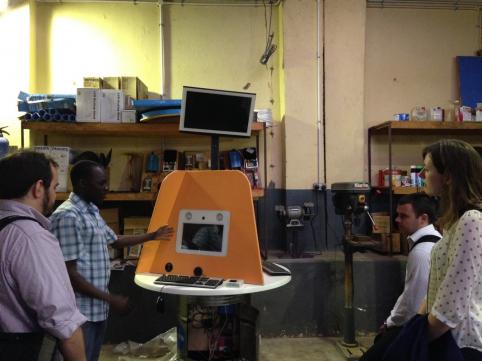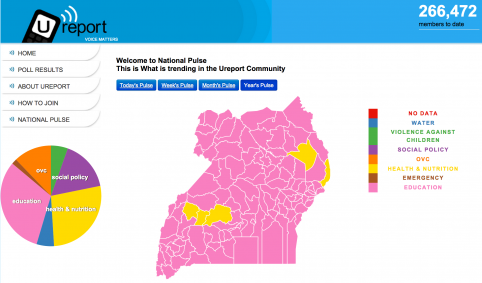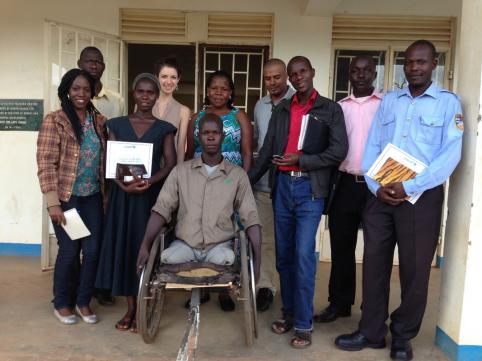How to best harness mobile technology to close the feedback loop is a topic of substantial interest and ongoing discussion in global development. This summer, I worked with UNICEF Uganda as an AidData Summer Fellow to examine how Ureport—a citizen feedback mechanism using free text messages—can inform decision-making by local governments across Uganda. Hearing from district officials and members of several Youth Coalitions in the northern districts of Gulu, Kitgum, and Pader first-hand, I took away five important data lessons from these conversations (see site visit reports on DevTrac).

Matthew Robinson (AidData Summer Fellow), Danny Walker (AidData Research Consultant), and Martha Staid hear about UNICEF’s digital kiosks at the Innovation Lab.
Data is only useful if it can be used.
UNICEF Uganda seeks to bolster citizen feedback by making information more accessible and usable to those who need it most, including: community-based advocacy groups, district government, and citizens themselves. Through creative inventions, like “digital drums” and “schools in a box,” UNICEF’s Innovation Lab works to connect more voices into the decision-making processes about development in their communities. Mobile phone-based programs such as uReport equip an even larger group of citizens to give voice to their thoughts on education and health issues. Ureport has already generated a wealth of data from its 261,920 reporters. Putting this data into the hands of those that can use it in their advocacy activities and programming is critical.

Map and chart of what Ureport users have been texting in about over the past year. Education, health and nutrition, and social policy were the most popular issues. (Source: http://www.ureport.ug/national-pulse/year/)
Simple is better, flexibility is best.
One of the most common suggestions our team heard was that short, straightforward reports with clear data visualizations are the preferred method to disseminate findings. Limited internet and lack of time are common challenges in putting uReport data to use. Language barriers can also prevent data from being disseminated according to Youth Coalition members we visited in Gulu and Pader.
One size doesn’t fit all.
The reports that are most useful for Youth Coalitions may be too detailed for local decision-makers with limited time or experience analyzing data. For government officials, simple charts and graphics may be more compelling. But even these might not resonate with development partners who want a richer report of what citizens are talking about. Clearly, it is important to customize reports to fit the diverse needs of those we hope will use uReport data.

Rebecca with members of the Gulu Youth Coalition after a meeting on local government use of Ureport data.
Local data is more relevant to citizens.
Aggregate crowd-sourced data can capture the big picture of a project, but when the data is further broken down it is even more illuminating. This is the rationale behind AidData’s collaboration with donors and governments to make subnational information on funding for development more accessible. In Uganda, the people we spoke with were most interested in seeing data specific to their districts, as well as uReport data from surrounding districts for comparison. Data disaggregated by gender and age was also of interest.
Increasing citizen ownership of data.
If feedback is only collected from citizens and this data is not communicated back to the communities from which it came, citizens aren’t able to use it to hold their government accountable for results. Government officials can also use this mechanism to better communicate with their constituents and to improve the quality and coverage of public services. It was encouraging to meet with civil society and government leaders who were eager to use citizen-sourced data to inform their work. Reflecting on these conversations, our Ureport team sought to create reports that make it easier to access and use citizen feedback data gathered from across Uganda. While more accessible data doesn’t guarantee that feedback is acted upon, our hope is that these efforts will give citizens a greater say in the future of their communities.